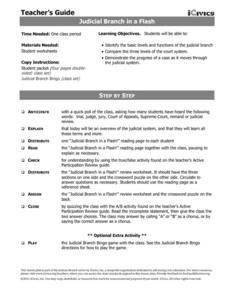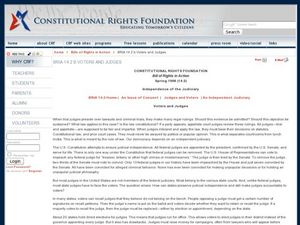State Bar of Texas
Baker v. Carr
Can the federal government override the state government to protect the citizens of the United States? The 1962 Supreme Court case Baker v. Carr outlines the issue of equal protection under the law. Scholars investigate with a short...
State Bar of Texas
Hernandez v. Texas
What if the jury is not made up of people from your ethnicity or background—are they still considered your peers? Scholars analyze the impact the Supreme Court case Hernandez v. Texas had on jury selection across the nation. Paired...
State Bar of Texas
Grutter v. Bollinger
A university decides not to allow a qualified scholar to enter its institution based on skin and gender—but this case is about a white female? The 2003 Supreme Court case Grutter v. Bollinger lays the foundation for open discussion and...
State Bar of Texas
Schenck v. US
Freedom of speech is absolute—or is it? The Supreme Court case Schenck v. United States has learners research what free speech really looks like. A short video along with paired work creates open discussion and thought on what speech is...
Federal Judicial Center
Amistad and Dred Scott—a Comparative Activity
What do slaves fighting for their freedom on board a ship and a slave fighting for his freedom in a courtroom have in common? Budding historians investigate the two different cases of the Amistad slave revolt and the Dred Scott argument....
EngageNY
Studying Conflicting Interpretations: Perspectives on Plessy v. Ferguson: Part 3
Scholars closely read Justice John Marshall Harlan's dissenting opinion in the Plessy v. Ferguson case, seeking to understand why he disagreed with the court's decision that racial segregation laws for public spaces were constitutional....
Curated OER
Justice
Students discuss strengths and weaknesses of the court system in providing equal justice for all. They identify factors that cause these weaknesses and recommend solutions.
Curated OER
History of Supreme Court
Learners study the role of the U.S. Supreme Court in U.S. history. They explore current events about the U.S. Constitution and discuss the Marbury v. Madison case from 1803. They identify the term "judicial review" and judicial...
Curated OER
Full Court Press
Students investigate the Supreme Court's role and function in the federal government and examine how Chief Justice Rehnquist's illness might affect the future of the Court. They write letters to President Bush on the Supreme Court...
Curated OER
Civil Rights and the Michigan Supreme Court I: A Case of Racial Discrimination in the late 1800s and Minority Supreme Court Justices
Students read the decision of the Michigan Supreme Court in the Ferguson v. Gies, a case dealing with discrimination in a restaurant. They participate in a class discussion about the case and the justices that presided over it. They...
Curated OER
History of the Michigan Supreme Court from the Territorial Court and the founding of the Michigan Supreme Court in 1836 to Justice Mary S. Coleman and her interpretation of "One Court of Justice"
Students trace the history of the Michigan Supreme Court from when the state was still a territory. They define procedures as they relate to the Court. They compare and contrast the territorial court to the new Court.
Curated OER
Supreme Court Newspaper
Students examine the purpose and responsibilities of the Supreme Court and its justices. In groups, they research a specific case and identify how the Supreme Court affects their lives. Using the information they find, they create a...
Curated OER
In the Courts
Students explore desegregation in the courts. In this civil rights instructional activity, students listen to their instructor present a lecture on Supreme Court cases Brown v. Board of Education and Plessy v. Ferguson....
K20 LEARN
Worcester v. Georgia: Cherokee Sovereignty and Actions of the U.S. Government
Young historians study the Supreme Court case "Worcester v. Georgia" and note instances where the Justices defended the sovereign rights of the Cherokee. They also examine the actions of President Andrew Jackson and the...
Curated OER
Indiana Courts: How Do They Work?
Students identify the branches of Indiana's judicial system and determine the differences between the different courts and different types of cases. Students create a flow chart showing how a court case works its way through the legal...
iCivics
Judicial Branch in a Flash
What is the difference between the federal court and state court systems? What about criminal versus civil cases? Check out this resource that will offer your class members a general and effective overview of the judicial branch in the...
Curated OER
Supreme Court Confirmation Process
Students examine the Supreme Court and the confirmation process. They simulate a confirmation hearing with students role-playing as nominees and others as members of the Judiciary Committee. Students compose short essays outlining the...
Curated OER
Constitution
Ninth graders simulate a U.S. Supreme Court hearing concerning a First Amendment case about school prayer by participating in a hearing.
Curated OER
Voters and Judges
Learners analyze the work on independent judiciaries. In this federal courts lesson, students listen to their instructor lecture on details of federal cases. Learners respond to discussion questions and participate in an activity...
Curated OER
Constitutional Rights Of Students
Twelfth graders brief Supreme Court cases about student rights that they have studied over the past year, and apply them to a contemporary situation.
Curated OER
Bench-Pressing Issues
Students examine some of the issues that may be facing the changing United States Supreme Court. With further exploration, they formulate their own opinions and deepen their awareness of these critical topics.
Curated OER
New Jersey v. T.L.O. (1985)
Students examine student search and seizure. In this Supreme Court lesson, students examine primary documents from New Jersey v. T.L.O. and discuss the implications of the decision.
Curated OER
Ethnicity, Gender and the Courts
Eleventh graders explore their own beliefs about the qualities that make someone qualified to sit on the Supreme Court. In this American Government lesson, 11th graders write about and debate the ethnic, religious, and gender...
Curated OER
In Search of Rights
Seventh graders research Supreme Court cases. They formally debate court rulings, write a scenario portraying a possible futuristic America and participate in a field practicum for media production, while evaluating various social,...

























